|
|
|
Sort Order |
|
|
|
Items / Page
|
|
|
|
|
|
|
| Srl | Item |
| 1 |
ID:
083925
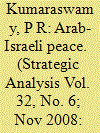

|
|
|
| 2 |
ID:
178795
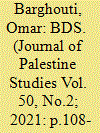

|
|
|
|
|
| Summary/Abstract |
Despite its military, diplomatic, and economic power, Israel’s regime of military occupation, settler colonialism, and apartheid still views the nonviolent, Palestinian-led global Boycott, Divestment, Sanctions (BDS) movement as a “strategic threat” to its system of injustice, waging a protracted war against the movement accordingly. This essay aims to contextualize Israel’s war on BDS by examining the movement’s origins, principles, impact, and theory of change. It analyzes the most critical challenges BDS is facing and its most promising strengths, especially its balancing of ethical principles with strategic effectiveness and its intersectional approach to the struggle for Palestinian freedom, justice, and equality.
|
|
|
|
|
|
|
|
|
|
|
|
|
|
|
|
| 3 |
ID:
141414
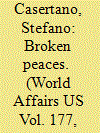

|
|
|
|
|
| Summary/Abstract |
Oslo is history. Twenty years have passed since the last significant peace accord between the Israelis and the Palestinians. The intervening years have been marked by an intifada and three military interventions in Gaza by the Israel Defense Forces that have left around seven thousand Palestinians and one thousand Israelis dead. The so-called “Peace Process” is in tatters and there seems to be no way of re-stitching it.
|
|
|
|
|
|
|
|
|
|
|
|
|
|
|
|
| 4 |
ID:
187759
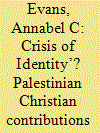

|
|
|
|
|
| Summary/Abstract |
Amman, as the capital of the Hashemite Kingdom of Jordan, has been said to suffer from a crisis of identity, a condition that is seen as impinging a sense of authentic urban memory and form. As it has become the destination of multiple refugee and migrant communities seeking safety in Jordan, Amman’s subsequent migrant make-up has been primarily narrated as a burden – on space, on resources and on understandings of the Jordanian national self-preventing a sense of national unity being found within its capital. Countering these narratives of burden and crises, this paper seeks to reconceptualise the role of migrants in Jordan’s capital as contributing to and participating in the development of Amman as a modern urban centre. By discussing one particular communal group – Palestinian Christians – and their contributions to the socio-spatial fabric of the city this paper aims to promote a shift in narrative around Amman in particular, and Jordan in general, as one which can embrace its history of not only migrating people but their ideas of modernity and urbanity and how they are imprinted on the urban landscape today.
|
|
|
|
|
|
|
|
|
|
|
|
|
|
|
|
| 5 |
ID:
116345
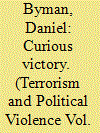

|
|
|
|
|
| Publication |
2012.
|
| Summary/Abstract |
The article examines Israel's successes and failures during the Second Intifada. It argues that Israel's advances came from an effective counterterrorism campaign involving a mix of military operations, defensive measures, and in particular improved intelligence gathering. Domestic resilience also proved strong in the face of a brutal terrorism campaign. Yet long-term victory remains elusive for Israel. Deterrence, always difficult against terrorist groups, is growing harder for Israel. Hamas's control of Gaza, and the mistrust and hatred sown during the Second Intifada, have hindered a political deal between Israel and moderate Palestinians. Much of what went into successful counterterrorism, notably the security barrier and the aggressive campaign of raids and arrests, does not jibe with most visions of what peace would look like and makes a deal harder to achieve. To make a peace deal work, Israeli counterterrorism must change, with measures including relocating parts of the security barrier, bolstering moderate Palestinian politicians, and working with, as opposed to undermining, Palestinian security forces in the West Bank.
|
|
|
|
|
|
|
|
|
|
|
|
|
|
|
|
| 6 |
ID:
100591
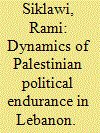

|
|
|
|
|
| Publication |
2010.
|
| Summary/Abstract |
This article addresses the issue of the Palestinian presence in Lebanon, examining the position of the Palestinians before, during, and after the last Lebanese Civil War (1975-1990), and assessing their future prospects in the country. The lessons and the aspects from this period are assessed with the goal of analyzing what is happening today. The wider significance of the Palestinian refugee situation within Lebanon is also given consideration.
|
|
|
|
|
|
|
|
|
|
|
|
|
|
|
|
| 7 |
ID:
187058
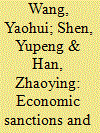

|
|
|
|
|
| Summary/Abstract |
While economic sanctions are often used as a foreign policy tool to fight state-sponsored terrorism, their efficacy remains unclear. This article argues that the intensifying economic hardship caused by sanctions forces the targeted governments to undertake a retrenchment strategy, which in turn reduces the overall frequency of state-sponsored terrorist attacks. Using cross-sectional-time-series data of Iranian-backed terrorism from 1987 to 2005, the article shows that sanctions against the Iranian regime were instrumental in reducing terrorist attacks by Hamas, Hezbollah, and the Palestinian Islamic Jihad (PIJ).
|
|
|
|
|
|
|
|
|
|
|
|
|
|
|
|
| 8 |
ID:
126834
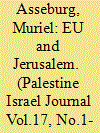

|
|
|
|
|
| Publication |
2011.
|
| Summary/Abstract |
The article presents the author's views regarding the conflicting policies of Israel and the European Union (EU). The author argues the relevance of turning Jerusalem as an open city for both Jews and Palestinians as part of the peaceful settlement. The author cites the impact of EU's intervention on Israel's amicable settlement with Palestine. Moreover, the author also denotes the efforts of U.S. President Barack Obama for the said settlement.
|
|
|
|
|
|
|
|
|
|
|
|
|
|
|
|
| 9 |
ID:
085463
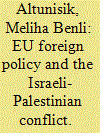

|
|
|
|
|
| Publication |
2008.
|
| Summary/Abstract |
This article aims to analyse the EU's evolving involvement in the management and resolution of the Israeli-Palestinian conflict. By using the framework of EU 'actorness', it argues that the EU has had the 'opportunity, presence and capabilities' to be an actor in the conflict. Developments in the international and EU contexts, as well as in the conflict itself, both allowed, and at times forced the EU to be more active. As a result the EU has become a more important actor in the conflict space. Yet this occurred at the expense of the EU's decreasing distinctiveness as an actor.
|
|
|
|
|
|
|
|
|
|
|
|
|
|
|
|
| 10 |
ID:
082157
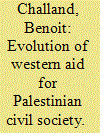

|
|
|
| 11 |
ID:
080667
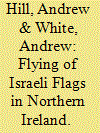

|
|
|
|
|
| Publication |
2008.
|
| Summary/Abstract |
In the spring of 2002 Israeli flags began to appear in loyalist communities in Northern Ireland. The appearance of these flags was in one respect explained as a response to the increased prevalence of Palestinian flags in nationalist neighbourhoods. However, the appearance and continued display of the Israeli flag can be seen to extend beyond a "wholly relational" dynamic to encompass the connotations this flag has come to possess for those who fly it in regard to the contemporary political situation within Northern Ireland and events on the international stage in the context of the United States' post-September 11 "War on Terror." At the same time, the flying of the Israeli flag in Northern Ireland provides a graphic demonstration of the increased prevalence of political symbolism in the post-Troubles era and the way in which groups in Northern Ireland have sought to reference and draw upon similar conflict situations for their own agendas.
|
|
|
|
|
|
|
|
|
|
|
|
|
|
|
|
| 12 |
ID:
167643
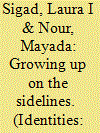

|
|
|
|
|
| Summary/Abstract |
By examining the experiences of the children of Palestinian collaborators whose families have relocated to Israel, this study explores how youth negotiate self within the context of marginalisation and cultural dislocation. Due to the actions of their parents, the research participants have become outsiders and outcasts in their Palestinian communities of origin, outsiders in Israel, and outsiders among Israeli-Arabs. Based on qualitative, in-depth interviews with 11 Palestinian male youths, we describe and analyse the experience of identity negotiation in the context of fear and their families’ past deceit. Our findings highlight that the youths’ identities are negotiated by engaging in a dialogue of self on belonging and not belonging that is based on visions of their past, present and future selves. This is accompanied by a forced dialogue with others, explaining who they are in order to fit in with the ‘audience’, a presentation that is then acted out.
|
|
|
|
|
|
|
|
|
|
|
|
|
|
|
|
| 13 |
ID:
170905


|
|
|
|
|
| Summary/Abstract |
The link between the Holocaust and the Nakba is probably the most charged for both Jews and Palestinians. To Jews, the Holocaust is a foundational past, and some would say a unique one, and thus to discuss it in conjunction with any other event may appear to banalize the extermination of the Jews and even to present a moral and political threat. To Palestinians, the Nakba is a foundational past, and since the Jews invoke the Holocaust to justify Zionism and Israel’s actions, to many Palestinians recognition of the Holocaust is tantamount to legitimizing the injustices of the Nakba and the iniquities that Israel continues to wreak upon them. To Germans as well, the juxtaposition of these two events is a sensitive matter, since they feel particularly responsible for the memory of the Holocaust.
|
|
|
|
|
|
|
|
|
|
|
|
|
|
|
|
| 14 |
ID:
126865
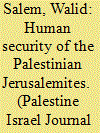

|
|
|
|
|
| Publication |
2011.
|
| Summary/Abstract |
The article presents the author's views concerning the safety and security condition of several Palestinian Arabs in East Jerusalem. The author mentions the move of the Israeli government for these settlers by implementing policies through military occupation. The author cites the challenges faced by Palestinians due to the ailing condition of their security. The marginalization enforced for Palestinians is also noted.
|
|
|
|
|
|
|
|
|
|
|
|
|
|
|
|
| 15 |
ID:
132289
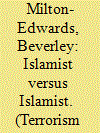

|
|
|
|
|
| Publication |
2014.
|
| Summary/Abstract |
Islam's diversity is a direct result of centuries of schism and factionalism, and presents a challenge to the original spirit of unity as envisaged by its founder, the Prophet Mohammed. Rivalry within Islam undermines the precedent notion of unity through communal belonging (tawhid and ummah). Yet in the twenty-first century this diversity is ignored, and political Islam is represented as being more of a monolith than a spectrum of ideas and aspirations. Generally, the materialization of new Islamist groups is a challenge to those who hold that unity is all. In the Gaza Strip, specifically, the dominant Islamist actor, Hamas, is facing internal challenges from other Islamist elements. These rival Islamists are also influenced by events across their border in post-revolutionary Egypt where a plethora of new Islamist actors are vying for political space and power. This article deals with Hamas's Islamist rivals, and the effects they have had on Hamas's governance of the Gaza Strip, and political and religious legitimacy within it. It will focus on ideological and violent disputes between the Islamist elements in Gaza, and the means by which Hamas and its security elements have tackled newly emerging rivals.
|
|
|
|
|
|
|
|
|
|
|
|
|
|
|
|
| 16 |
ID:
170947
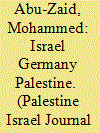

|
|
|
| 17 |
ID:
170953
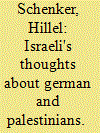

|
|
|
|
|
| Summary/Abstract |
My first contact with Holocaust survivors was when I joined Kibbutz Barkai in 1963. The founders of the kibbutz, members of the socialist-left Zionist Hashomer Hatzair youth movement, were all Holocaust survivors from Poland and Romania. Most had survived the horrors of the concentration camps, while a few had escaped and joined the Red Army or partisans fighting the Nazis. They came to the fledgling State of Israel to rebuild their broken lives.
|
|
|
|
|
|
|
|
|
|
|
|
|
|
|
|
| 18 |
ID:
102531
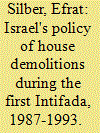

|
|
|
|
|
| Publication |
2011.
|
| Summary/Abstract |
Israel's counter-terrorism policies have often aroused the anger of the Palestinians and the international community. One of the most controversial policies is the demolition and sealing of houses of families connected to a terrorist act. While there is significant media attention on this controversial policy, there have been very few academic studies examining the effectiveness of this policy. This article examines Israel's policy during the first Intifada (1987-1993), administered in accordance with section 119 (1) of the Defence Emergency Regulations of 1945 from the British Mandate government. Based on a carefully structured empirical analysis, the article concludes that the benefits of this policy do not outweigh the costs.
|
|
|
|
|
|
|
|
|
|
|
|
|
|
|
|
| 19 |
ID:
141346
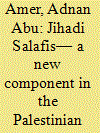

|
|
|
|
|
| Summary/Abstract |
This study is published at a time when the Gaza Strip is undergoing accelerated changes with the growth of Jihadi1 Salafi streams in Egypt, mainly in the Sinai Peninsula, which shares long borders with Gaza. Consequently, Gaza is vulnerable to all major events following the armed attacks launched by Salafi groups against the Egyptian army in late June and early July 2015.
|
|
|
|
|
|
|
|
|
|
|
|
|
|
|
|
| 20 |
ID:
170951
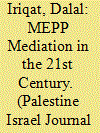

|
|
|
|
|
| Summary/Abstract |
During the last three decades, the world witnessed rising hopes for a peaceful resolution of the Palestinian-Israeli conflict. There were many efforts, most of which ended in failure. July 2000 witnessed the most significant attempt at the Camp David summit, where the final-status issues were placed on the negotiations table, but no deal was completed. Since then, violence and instability have escalated in the region, and today a peacefully negotiated deal is definitely far from reality.
|
|
|
|
|
|
|
|
|
|
|
|
|
|
|
|
|
|
|
|
|